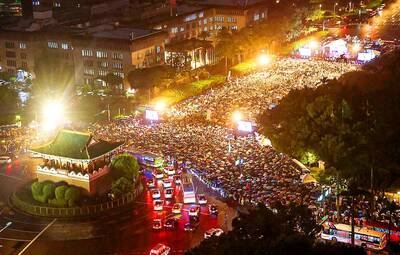Shelter and other forms of assistance would be provided to Hong Kong asylum seekers once the Hong Kong humanitarian assistance action plan proposed by President Tsai Ing-wen (蔡英文) last month passes a review by the Executive Yuan today, a source familiar with the matter said.
The plan, which comes in response to Beijing’s introduction of national security legislation for the territory, would involve many government agencies, including the ministries of the interior, the health and welfare, labor, education and justice, the National Security Bureau and the Investigation Bureau, the source said last week.
The plan, which the Mainland Affairs Council helped draft, would see the establishment of a residential facility for asylum seekers who are financially unable to pay for their own, the source said.
The program is intended to be the implementation of Article 18 of the Act Governing Relations With Hong Kong and Macau (香港澳門關係條例), which states that assistance should be provided to residents of the territories who are suffering political persecution, they added.
The council is also seeking to amend Article 25 of the Enforcement Rules of the Act Governing Relations With Hong Kong and Macau (香港澳門關係條例施行細則) to stipulate that during the period after an asylum seeker applies for residence and before such residence is granted, the government should provide “care and accommodations,” the source said.
Although there is a two-month preview period for proposed amendments to the enforcement rules, once the plan is approved by the Executive Yuan, it can be applied immediately to those from Hong Kong who have already applied for residence, the source said.
At present the government typically processes asylum seekers from Hong Kong based on evaluations of their background and risk to national security provided by human rights lawyers in Hong Kong. The cases are then handed over to local human rights lawyers.
Under the proposal, background and security checks would be handled by the National Security Bureau and the Investigation Bureau, which would help prevent Chinese agents from slipping in, the source said.
Part of the proposal’s aim is to provide assistance transitioning to life in Taiwan, such as providing psychological support, answering questions about daily life in the nation, helping with enrollment in the National Health Insurance program, and help finding academic programs, training and employment, the source said.
Hong Kong asylum seekers have usually relied on fundraising in Hong Kong to support them while they wait for their applications to be processed, but that is becoming more difficult, the source said.
The government is also planning to budget funds to help them, the source said.

The Central Weather Administration (CWA) today issued a "tsunami watch" alert after a magnitude 8.7 earthquake struck off the Kamchatka Peninsula in northeastern Russia earlier in the morning. The quake struck off the east coast of the Kamchatka Peninsula at 7:25am (Taiwan time) at a depth of about 19km, the CWA said, citing figures from the Pacific Tsunami Warning Center. The CWA's Seismological Center said preliminary assessments indicate that a tsunami could reach Taiwan's coastal areas by 1:18pm today. The CWA urged residents along the coast to stay alert and take necessary precautions as waves as high as 1m could hit the southeastern

FINAL COUNTDOWN: About 50,000 attended a pro-recall rally yesterday, while the KMT and the TPP plan to rally against the recall votes today Democracy activists, together with arts and education representatives, yesterday organized a motorcade, while thousands gathered on Ketagalan Boulevard in Taipei in the evening in support of tomorrow’s recall votes. Recall votes for 24 Chinese Nationalist Party (KMT) lawmakers and suspended Hsinchu City mayor Ann Kao (高虹安) are to be held tomorrow, while recall votes for seven other KMT lawmakers are scheduled for Aug. 23. The afternoon motorcade was led by the Spring Breeze Culture and Arts Foundation, the Tyzen Hsiao Foundation and the Friends of Lee Teng-hui Association, and was joined by delegates from the Taiwan Statebuilding Party and the Taiwan Solidarity

Instead of threatening tariffs on Taiwan-made chips, the US should try to reinforce cooperation with Taiwan on semiconductor development to take on challenges from the People’s Republic of China (PRC), a Taiwanese think tank said. The administration of US President Donald Trump has threatened to impose across-the-board import duties of 32 percent on Taiwan-made goods and levy a separate tariff on semiconductors, which Taiwan is hoping to avoid. The Research Institute for Democracy, Society, and Emerging Technology (DSET), a National Science and Technology Council think tank, said that US efforts should focus on containing China’s semiconductor rise rather than impairing Taiwan. “Without

The National Museum of Taiwan Literature is next month to hold an exhibition in Osaka, Japan, showcasing the rich and unique history of Taiwanese folklore and literature. The exhibition, which is to run from Aug. 10 to Aug. 20 at the city’s Central Public Hall, is part of the “We Taiwan” at Expo 2025 series, highlighting Taiwan’s cultural ties with the international community, National Museum of Taiwan Literature director Chen Ying-fang (陳瑩芳) said. Folklore and literature, among Taiwan’s richest cultural heritages, naturally deserve a central place in the global dialogue, Chen said. Taiwan’s folklore would be immediately apparent at the entrance of the